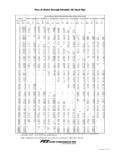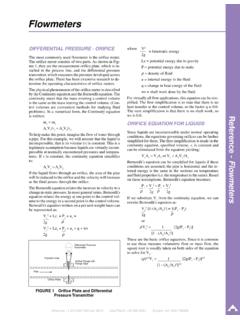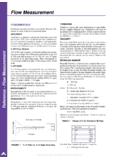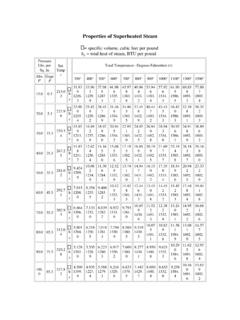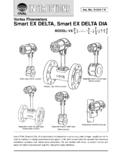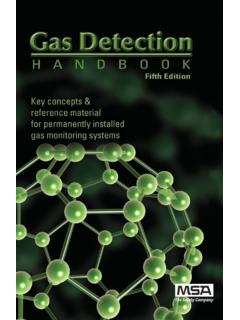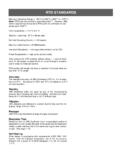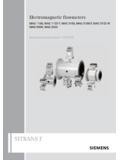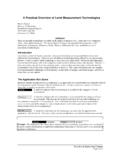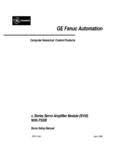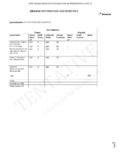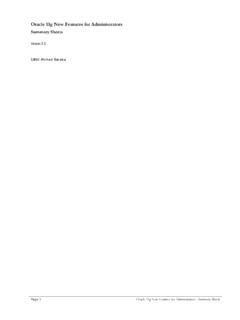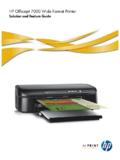Transcription of SIPART PS2 Positioner Quick Start-up Instructions …
1 SIPART PS2 Positioner Quick Start-up Instructions 15900-752 Rev 1 October 2007 These Instructions are for PS2 Model Codes: 6DR5x1z, 6DR5x2z (where x = 0,1,2,3,5,6 and z = 0,1,2). IMPORTANT: Refer to SIPART PS2 manuals for detailed procedures, certifications, approvals and applicable warnings and cautions. Once a Positioner is properly mounted, per bracket kit Instructions , verify that all hardware is secure and stem coupling has NO BACKLASH. Positioner Connections: Remove outside cover. Refer to terminal illustration label (located between terminals and buttons) and make appropriate electrical connections. Before applying supply air, note maximum air pressure rating of actuator. Exceeding this could cause personal injury or equipment damage. % V- U+ c c c P NOINI Apply appropriate supply pressure to pneumatic port labeled as PZ . Ports Y1 and/or Y2 are outputs. Positioner Operation: The PS2 has an LCD display and three (3) input buttons, as shown at right.
2 NOINI1 When the Positioner is powered up for the first time, the display will show; NOINI (no initiation) will be flashing. 2 Insure the valve/actuator moves freely from full closed to full open by driving actuator with movement buttons: U or V. Pressing only one button will slowly drive actuator. To rapidly move actuator: press and hold one movement button and then press the other movement button. If no movement occurs reverse the button sequence. Once the actuator has reached the end position, reverse the push button sequence to rapidly move the actuator to its opposite position; verify mounting linkage is secure and free from any obstructions throughout entire valve stroke. Release the push button(s) to stop actuator movement. Positioner Calibration: 1 Drive actuator to approximately mid-stroke using the movement buttons, as described above. 2 Rotary Actuator: Insure yellow Transmission Slide bar is set to 900; refer to illustration label located between terminals and buttons.
3 The end of the bar can be seen on the long side of the Positioner , as shown below. Use a small screwdriver to push transmission bar to 90 setting (opposite side from the clutch wheel ). Linear Actuator: Insure yellow Transmission Slide bar is set to 330 for valve strokes up to ; strokes greater than may require 90 setting. Refer to illustration label located between terminals and buttons. The end of the bar can be seen on the long side of the Positioner as shown below. Use a small screwdriver to push transmission bar to 33 setting (same side of clutch wheel ). Clutch Wheel Clutch Wheel Lock Transmission Slide Bar P h dII u IIU 3 Push and hold the % button until the display changes to setup mode; The number in the lower left corner is the parameter number. 1 YFCT UAY 4 Insure parameter number is 1. Pressing and releasing % button steps through the parameters. Rotary Actuator: Linear Actuator: UAY 1 YFCT 5R Display should read: 5L Display should read: turn 1 YFCT U and V buttons edit parameter U and V buttons edit parameter 6R Push % button once, the display reads: 6L Push % button once, the display reads: Use U or V button to match setting in step 2 - Linear Actuator.
4 7 Push the % button (once for rotary, twice for linear) until display reads: 8 Hold the U button until the actuator starts moving, then release. 900 2 YAGL no 4 INITA 330 2 YAGL The red color in this display is for recognition only. 9 If actuator strokes and stops and the display shows a u , the display tolerance has been exceeded. (A) Check to make sure the transmission bar is properly set; if set correctly, see step (B). (B) Adjust feedback clutch wheel. Note: The feedback clutch wheel should rotate easily with thumb pressure; if not, adjust the yellow wheel (located inside the housing, just below the knurled thumb wheel) with a small screw driver, rotating it TO THE RIGHT. This will loosen the clutch wheel and allow easy rotation. Refer to the diagram in step 2 to locate the clutch wheel. h dII O II U P The red color in this display is for recognition only. Rotate this wheel until display reads 0 as shown at right. The number in the upper right corner of the screen should be approximately (C) Rotary Actuator: Push the U button.
5 Linear Actuator: Push the V button. 10 RUN 3 will display the opening and closing speeds of the actuator. Optional: To initiate the Leakage test, press the U button for 2 seconds; the display reads as shown: 11 LEAKage test will last 60 seconds and end with a leak value in % of stroke leaking per minute. 12 Push U button to continue Initialization and setup will continue through RUN 4 and 5. 13 Initialization is complete after RUN 5 and display will read FINISH. 14 Push the % button once, the display reads as shown at right: 15 The Positioner is now calibrated to the valve and actuator. You have the choice to go to AUTOMATIC OPERATION or any of the remaining parameters: 5, 6, 16 To return to automatic mode, hold the % button until the display changes to: or or or Older PS2 New Hart PS2 New FFH1 New Profibus PA The display will automatically change to read: The valve can be manually operated with U and V buttons.
6 17 Push and release the % button once, the display will read: The Positioner should now respond to the control signal source. FACTORY RESET 1 - To reset the Positioner to its original factory settings, go to configuration mode and parameter PRST (factory reset). Note: To enter configuration mode, press and hold the % button as outlined in step 3. Depending on the PS2 version the PRST function will be at one of the following menu functions; refer to the instrument s leaflet for proper parameter number: 55 (older PS2); 50 (New HART PS2); 51 (New Profibus PA); or 48 (New Foundation Fieldbus) 2 - Toggle the % button until you reach the PRST menu function. Advance through menu functions by repeatedly pressing the % button, or go backwards through the menu by holding the % button down and repeatedly pressing the V button. When you reach the PRST menu, the display reads: or or or Older PS2 New Hart PS2 New Profi PA New FFH1 3 - Press & Hold the U button, the display will read: Continue holding the U button until the display reads: This means OK!
7 AUT XX LEAKG 00 MIN P 4 INITA MAN XX no 55 PRST start 55 PRST oCAY no 50 PRST no 51 PRST no 48 PRST C5 VER VER VER VER tESt All parameters are now returned to factory default settings and unit is in a non-Initialized state. NOINI (no initiation) will be flashing. NOINI All product designations may be trademarks or product names of Siemens Energy & Automation, Inc. or other supplier companies whose use by third parties for their own purposes could violate the rights of the owners. Siemens Energy & Automation, Inc. assumes no liability for errors or omissions in this document or for the application and use of information in this document. The information herein is subject to change without notice. Procedures in this document have been reviewed for compliance with applicable approval agency requirements and are considered sound practice.
8 Neither Siemens Energy & Automation, Inc. nor these agencies are responsible for repairs made by the user.
